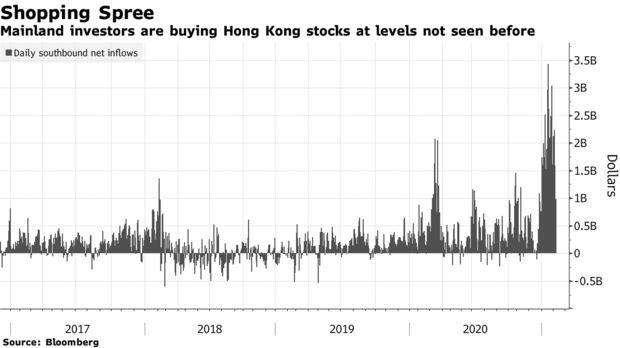Hong Kong News

Hong Kong Stock Market Is About to Lose Biggest Source of Funds
Starting Tuesday, trading links via Hong Kong’s exchange operator allowing mainland traders to buy domestic stocks will halt through Feb. 17 due to the Lunar New Year holiday. The stock connect closure will slam the brakes on record levels of inflows that helped propel Hong Kong’s equities market to its best start to a year since 1985.
Investors north of the border turned bargain hunters in late 2020 after valuations in some sectors onshore reached the highest in more than a decade. Mainland investors net bought a total of nearly $48 billion worth of Hong Kong stocks in the first five weeks of this year, which is already more than half of 2020’s total.

“We think it might be worthwhile to take some profit ahead of the trading link halt for stocks that are heavily boosted by southbound investors” including Tencent Holdings Ltd., Meituan and China Merchants Bank Co Ltd, said Zhuang Jiapeng, a fund manager at Shenzhen JM Capital Co.
Still, the incentive to take money out of the market is low given that people swapping investment ideas during the holidays could spur further gains when the links with Shenzhen and Shanghai reopen. Zhuang said he’s considering moving all of his fund’s assets into Hong Kong at some point later this year, compared with his current 70% exposure.
While the shutting of the links for the Lunar New Year is an annual occurrence, traders are taking a closer look given this year’s unprecedented inflows. Tencent, for example, has seen southbound turnover via the links account for about 42% of the stock’s average daily turnover so far this year, according to data compiled by Bloomberg.
Investors say longer-term exposure to Hong Kong is appealing given the number of mutual funds piling into the city’s assets. The financial hub is the venue for an increasing number of hot startup listings and tech giants, including short-video platform Kuaishou Technology, which debuted on Friday. Tencent Music Entertainment Group has selected banks to arrange its planned second listing in the city.
“Hong Kong stocks will remain attractive to mainlanders while outperformers in A-shares have skyrocketed and valuations are insane,” said Dai Ming, a fund manager at Hengsheng Asset Management Co. “We are still just at the beginning of a long-term buying trend for Hong Kong stocks.”











